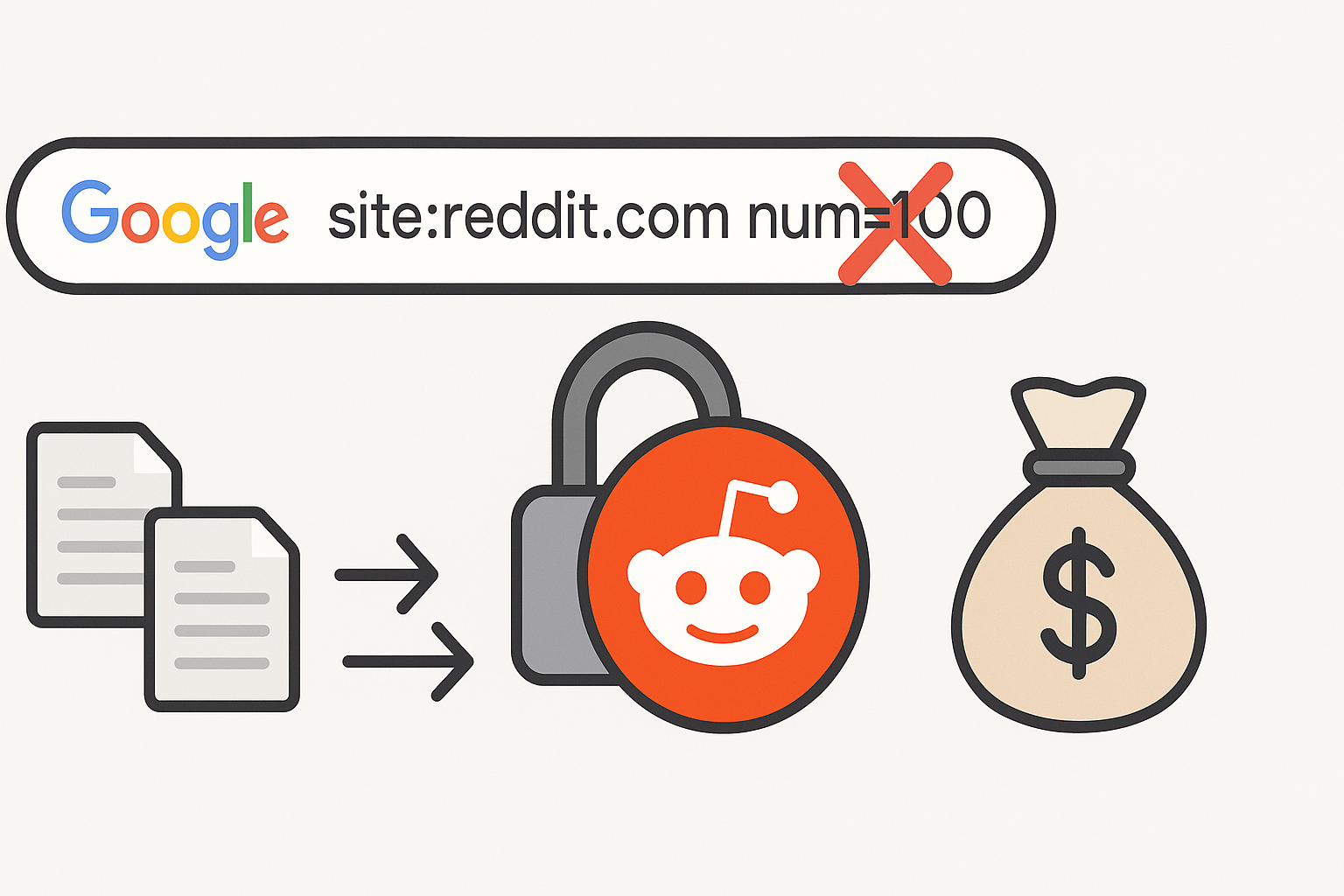Reddit shares took a beating last week—a 7% plunge that had analysts clutching their pearls—after reports emerged that ChatGPT's citations of Reddit content had nosedived from 14% to a measly 2%. The narrative quickly solidified: Reddit is losing its AI relevance, the content moat is crumbling, sell, sell, sell!
But hang on a second.
What if I told you this entire selloff was based on a fundamental misunderstanding of what actually happened? Because that's exactly what it looks like from where I'm sitting.
The real story here isn't about Reddit's diminishing value. It's about Google shutting down a technical loophole that was essentially letting AI companies access Reddit's valuable content without paying for it. And Wall Street completely missed it.
The Technical Trigger Nobody's Talking About
Here's what actually happened: On September 10th, Google quietly eliminated something called the "num=100" search parameter. Not exactly headline-grabbing stuff, right?
But this tiny technical change had massive ripple effects. Suddenly, instead of being able to pull 100 search results in a single query, scrapers could only access 10-20 results at a time. Reddit content that previously ranked between positions 11-100 effectively disappeared from the data these AI models were ingesting.
The result was predictable. ChatGPT citations plummeted, and Reddit's stock price followed suit, tumbling from $240 to $207.
I've been covering the intersection of tech and finance for years, and I've rarely seen a more perfect example of the market misreading technical signals.
From Free Lunch to Paid Dinner
Look, this wasn't Reddit losing relevance—it was Google inadvertently closing a backdoor that AI companies were using to access Reddit's content without paying market rate.
Think about what this actually means for companies like OpenAI. They now face a stark choice: pay Reddit directly for API access or watch their AI models get dumber as they lose access to one of the internet's richest sources of human conversation.
That's not a devaluation scenario. That's... leverage.
In my conversations with several industry analysts (none of whom wanted to be quoted directly), the consensus was clear: "This isn't a Reddit problem. It's an AI company problem."
The Accidental Monopoly
There's something deeply ironic about Google—a company currently swimming in antitrust investigations—inadvertently handing Reddit monopoly pricing power over its own content. Yet that's precisely what happened.
What makes Reddit unique? It's sitting on 18 years of continuously updated, human-generated content covering virtually every topic imaginable, all organized by interest and quality-filtered through voting systems. For AI models trying to understand how humans actually communicate about real problems, this is gold.
Where else can you find this combination of breadth, depth, and freshness? Stack Overflow? Too tech-focused. Quora? In decline. Twitter/X? Increasingly toxic and noisy. Discord? Mostly private and not indexed.
(I'm not even going to dignify Facebook as a comparison. Have you seen the quality of conversation there lately?)
This creates what economists call "inelastic demand"—AI companies need this data, there's no readily available substitute, and now they have to pay whatever the market will bear.
Show Me the Money
Is this just theoretical? Hardly. Reddit has already secured deals reportedly worth about $60 million annually from both Google and OpenAI, with total AI licensing revenue exceeding $200 million on a run-rate basis.
And—this is crucial—they're negotiating "dynamic pricing" terms that could significantly expand as AI usage grows.
The fundamentals back up this strategy. Reddit's Q2 revenue hit $501 million (up a staggering 84% year-over-year) with daily active users growing 51% to 97 million. Oh, and they're profitable now, with positive free cash flow.
Does that sound like a company losing relevance to you?
The Risks (Because Nothing's Ever Simple)
To be fair, there are legitimate concerns. Any investor considering this opportunity should consider:
- These AI negotiations could go sideways or yield less favorable terms
- OpenAI and other AI developers might find ways to reduce their Reddit dependency
- At 8x sales, the valuation isn't exactly a bargain-basement deal
- Push too hard on monetization, and Reddit might damage user experience—the very thing that creates its content moat
- Competition could emerge... though those network effects are awfully hard to replicate
But at $207, after a panic sell triggered by widely misunderstood news? The risk/reward balance looks intriguing, to say the least.
The Bigger Picture
What fascinates me most about this situation is how it illustrates the evolving economics of content in the AI era.
For years—decades, really—social platforms have grappled with the fundamental tension between user-generated content (which creates value) and monetization strategies (which capture it). Users create amazing stuff, platforms figure out how to make money from it, users get annoyed but mostly stick around... rinse and repeat.
AI has suddenly transformed high-quality user-generated content from "nice to have" to "strategically essential." Reddit's content—those authentic human conversations across every domain imaginable—represents exactly the kind of grounded, diverse, continuously updated information that keeps AI models from hallucinating or going stale.
In a twist that even the most creative fiction writer might have struggled to invent, the very technology threatening to disrupt so many content businesses might end up giving Reddit unprecedented pricing power.
The market saw "citations down" and panic-sold. A deeper analysis suggests what really happened was "free access eliminated, paid access now mandatory."
Sometimes the most profitable insights come from understanding precisely what the market misunderstands.
I'll be watching Reddit's next earnings call with particular interest. Sometimes the market corrects its mistakes quickly... and sometimes it gives you a juicy discount because it misinterpreted the significance of a technical parameter change.
These things happen. Occasionally, they create opportunities.
